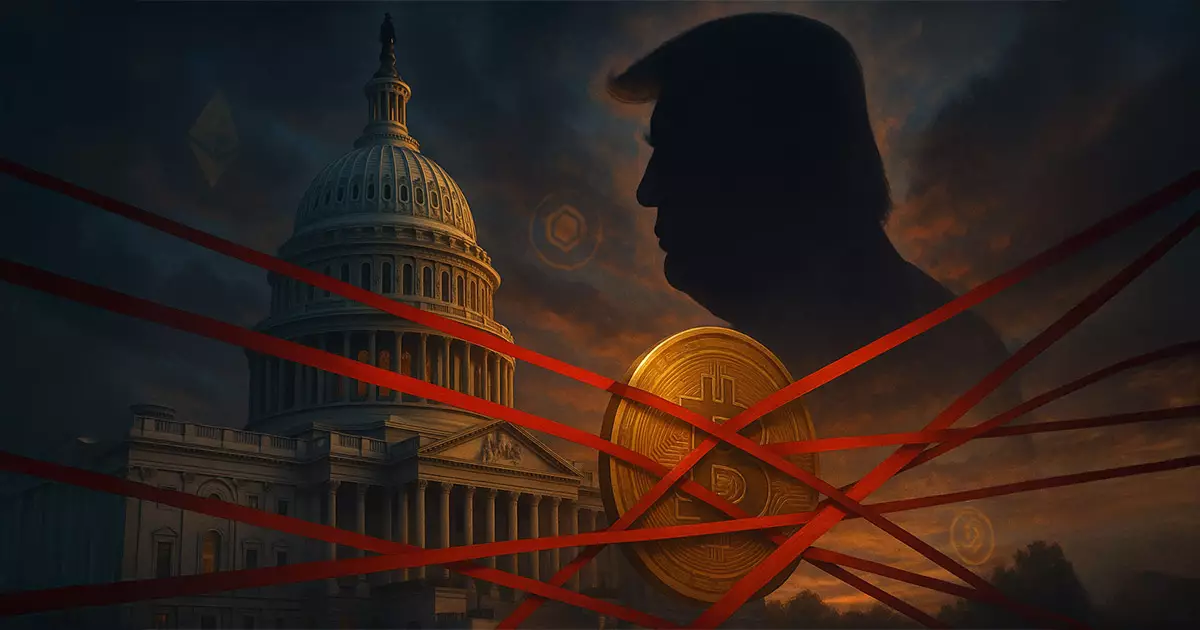In the ever-evolving world of cryptocurrency, few figures loom larger than former President Donald Trump. His entry into the crypto arena with ventures like the $TRUMP memecoin has sparked not just excitement but also serious ethical concerns, and rightfully so. The intersection of politics and personal profit is treacherous; it raises the stakes around regulatory frameworks like the GENIUS Act intended to create clarity in the crypto landscape. In doing so, Trump risks diminishing the importance of these regulatory efforts, artfully turning them into vehicles for personal enrichment rather than public good.
Ryan Gilbert, founder of Launchpad Capital, aptly summarized this dilemma when he lamented how “personal business is getting in the way of good policy.” This statement starkly highlights the overarching question: when does the line between public service and private gain blur beyond recognition? Trump’s engagement in crypto ventures, particularly in the face of legislation designed to regulate the sector, represents a troubling example of a political figure placing personal interests above those of the nation.
Legislative Stagnation Amid Personal Conflict
The GENIUS Act, which aims to establish a clearer regulatory framework for payment stablecoins, should ideally be sailing through Congress. Yet it failed to pass in the Senate with a razor-thin margin, exposing the fragility of bipartisan support in contentious times. Katrina Paglia, chief legal officer at Pantera Capital, expressed disappointment but not surprise, highlighting a sense of inevitability about political maneuvering in Washington. Investors are sitting on the sidelines, uncertain and wary, while lawmakers bicker instead of delivering results that could foster a healthier financial ecosystem.
Indeed, ethical concerns surrounding Trump’s potential profit have cast a long shadow over this essential legislation. It’s no secret that $2 billion in losses were reported by small investors when the price of the $TRUMP memecoin plummeted, contributing to a scandal defined by the ideas of deception and manipulation that are all too common in today’s politics. The reality is stark: vulnerable investors are not merely collateral damage in a broader economic strategy but actual victims of a political system skewed towards personal profit.
A New Era of Influence Peddling?
The rampant speculation and personal enrichment from cryptocurrency ventures ought to serve as a wake-up call. Trump has reportedly profited around $350 million from the memecoin, and it leaves little room for doubt regarding the sophisticated dance of influence peddling embedded within his actions. This sentiment was echoed by multiple Democratic Senators who have drawn a direct line from Trump’s financial gains to acute concerns about corruption and regulatory capture. In their view, it isn’t merely a conflict of interest; it’s a full-fledged threat to the democratic process.
Chastity Murphy from the Treasury Department further emphasized this by characterizing Trump’s crypto endeavors as potential vehicles for “influence peddling, bribery, and regulatory capture.” When political leaders prioritize personal gain over public welfare—especially in areas as unregulated as cryptocurrency—the consequences can be dangerously far-reaching, eroding trust in government institutions and legislative processes.
The Senate’s Uncomfortable Conversation
Even as the Senate grapples with the fallout of these revelations, bipartisan negotiations continue on the GENIUS Act, signaling an urgent need to overcome the barriers posed by Trump’s controversies. This situation illustrates a crucial point: the American political system requires robust checks and balances devoid of leaders who exploit their platforms for personal gain. Senator Mark Kelly’s proposal of the End Crypto Corruption Act stands out as a necessary step in curtailing the reckless intertwining of political ambitions and financial ventures—though one can’t help but wonder if such measures will be effective in an environment already plagued by distrust.
Nevertheless, the real question persists: can we regulate away the corruption that seems to stem from the conflation of business and politics as evidenced by Trump? As investigations into Trump’s ties with Binance unfold, the discourse surrounding ethical governance grows increasingly complex. U.S. Senator Jeff Merkley pointedly noted that those wishing to influence the president could simply buy cryptocurrencies he owns. This catch-22 illustrates how the very essence of our political fabric could degrade if not properly scrutinized and managed.
The unfolding situation in Washington regarding Trump’s crypto ventures is a testament to the dangers of unregulated greed in American politics. The consequences are profound: a potential erosion of investor trust, legislative paralysis over ethical dilemmas, and a growing sentiment among the public that their leaders are more concerned with lining their pockets than serving the national interest. It’s a disheartening reflection of a democracy at a crossroads—one where ethical governance must take precedence, lest the public be left to navigate a damaging landscape of unchecked political opportunism.


Leave a Reply